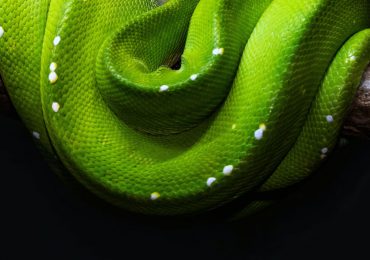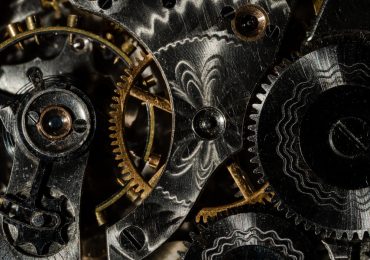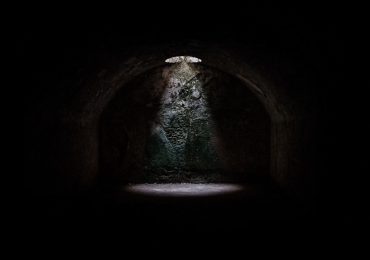Exclusive to The JRB, a new short story by Julie Nxadi.
This story is excerpted from Cutting Carrots the Wrong Way, a new anthology edited by Kobus Moolman and published by uHlanga Press.

Lolwethu Oluthando
UNokuzola’s father loved her like a son. She was her parents’ only child, but he loved her as if she were a boy born last after five daughters. A love of relief. A preoccupying kind of love that compelled him to steal two pink viennas everyday from Whitley’s Butchery (where he worked) because they were her favourites. A remarkable and public love, recognisable to their neighbours by the matching white gumboots that they would wear when they left at sunrise to look for that one heifer that always wandered too far. It was a love too big for her small frame, but one she wore playfully and proudly because it was hers to grow into. Even though it was heavy on some days … even though it hung past her feet and dragged all sorts of debris that she would have to shake off without him noticing on other days … she wore that love (that heavy love) proudly.
He used to tell the same story: A story of how she rejected her mother’s breast and preferred to be fed goat’s milk and inembe by him. He told anyone who would listen of how they went from elder to elder, traditional healer to traditional healer to find what the cause might be, but none could be found. He concluded, publicly—repeatedly—that she chose him. She could not hear sleep’s siren unless she lay on his chest. She could not rest. And it seemed that she continued to make this choice. She called him Tat’am as if it were his name. ‘Tata’ was not enough. ‘Tat’am’—‘My father’ nailing herself to him each time she said it. He belonged to her as much as she belonged to him.
The story he did not tell was that of uNokuzola arriving on a wave of death. That she grew quietly in a womb that he had already cursed and called a graveyard. That she unfurled, silent, in the pit of her mother’s grief put there by a smooth emulsion of chance, duty and frustration long after he had given up. That grief had already started to age him by the time she arrived and that he had become mean in his mourning. Mourning children that were there and then were not and in the years where there was nothing (not even a false alarm) mourning his manhood. Oh! He spent years mourning his manhood. He was a man with nothing but a bicycle and a wife and so he bought goats. But the goats’ feet kept rotting and despite his best efforts, their legs would collapse under them and they would sigh and huff themselves towards an unremarkable death. One grim day he stood over the last goat as it panted its way to its end, a neighbour walked by and saw his despair. ‘Awu! Tshangisa’, the neighbour sighed as he looked on from afar.
‘Ngumhlaba, Tshangisa. Ubolile umhlaba wakho, akhonto inokukhula apha.’
Nothing can grow here.
The neighbour left him standing there.
Nothing can grow here.
His eyes tapped across his land. The little iron sheet shelter he had built in the corner of the kraal for the goats. The patchy grass. The toilet standing alone in the corner of the yard. The house, whitewashed in calcimine with a bright blue door. He stood. Mourning.
Goat after goat.
Child after child.
Death after death.
Sure that his neighbour was right, that nothing could grow there.
He never told that part of the story.
He never told anyone that he did not notice that uNokuzola was there, not until she chose him.
But once she chose him, he loved her like a son.
UNokuzola’s mother watched from a distance, waiting her turn. She was sure her time would come. A time when the androgyny of childhood would begin to peel away revealing a girl who needs her mother. A girl who would need her tutelage. Her daughter. The daughter she had waited for through grief and the punishment of silence doled out by some unknown hand.
A silence that would be shattered only sometimes by the ratata of her husband’s careless words and menacing laughter. Laughing at himself for having married her. Laughing at himself for having hope. And she would do nothing but hide, right there in front of him. Right there before his eyes.
She remembered the goat.
The last goat.
The one that did not die quietly.
Her husband had gone to let it out at around 11am one grey Saturday and found it in the middle of the kraal, seizing. Its legs paddled as if it were running and it bit down and clenched its teeth with a clap between guttural bleats.
It would not stop.
It twisted its neck and buried its head in the loose soil, its eyes still wide with confusion. And every time it loosened and collapsed into a frightened pant, every time he thought it was over, it would snap stiff and clench, choking the air from its neck and squeezing a cry from its gut. She watched her husband look down at the twisted, screaming goat in defeat. For hours. He stood there and watched death at play, not moving.
Limp with frustration he looked on.
It would not stop.
All the goats were gone and the yard was weighted by silence.
Neighbours called their house ‘eslaghuis’, uNokuzola would grow up thinking it was because her father worked at a butchery.
No one would ever tell her that it was because her father would give away pounds and pounds of goat’s meat to whoever would take it.
He did not want it, that cursed meat, but there was always someone who did.
Someone … some man worse off than him that would take it.
All the goats were gone and the yard was weighted by silence.
It would not stop.
And then uNokuzola arrived and they got younger.
The air in the house was busy and things were growing. When she reached a year old her father bought a young heifer and by the time she was five they had two cows, a heifer, and a young bull. uNokuzola had brought with her relief. She had made a man of her father. There was chatter, there was laughter, there was sound. There were amagwinya being fried in shallow oil—the house was alive. And just out of frame, uNokuzola’s mother would look on, smiling at this silly pair, waiting her turn.
Her turn never came.
One hot day uNokuzola was fourteen and in the kitchen alone, washing dishes, still in her school uniform.
The zip on the side of her navy skirt was undone and the skirt itself barely hung off of her hip.
Her shirt, wrinkled at the bottom from being tucked in all day.
Her feet, swollen and pink from being bound in woolen socks and leather shoes.
She swirled the dishcloth in the steaming hot water mindlessly, a teaspoon scraping the bottom of the enamel dish rhythmically as it spun. She had only managed to wash her parents’ teacups from the morning before her hands turned bright red from the heat, and so she stood swirling the dishcloth in an attempt to cool the water and closed her eyes in an attempt to pass the time, floating just above herself—soft and warm.
‘Yintoni le?’
UNokuzola was snapped from her warmth by her mother’s cold hand slapping her arm away from her torso and exposing her slightly protruding belly. UNokuzola’s eyes peeled open to find her mother’s face squinted towards her hips, her horror accented by the red, white and black of her church uniform. She had waited patiently for her daughter, but all she saw before her was her peer.
A mother.
It was not quite disappointment that followed, but rather grief that returned.
Oh! The grief.
UNokuzola was not accustomed to silence, she did not know that her parents had a history with it. She did not know that she broke it then, and that now it had simply returned. She could not get used to it.
When her mother first told her father he clapped his hands in disbelief and then stood with arms akimbo.
He was bewildered.
He was angry.
But he was there.
Until he wasn’t.
UTat’am left uNokuzola somewhere in the Dambase homestead, the day that he went to claim damages. He had asked uTat’uCirha to accompany him as he could not go alone. UCirha (a quiet man, an odd man, also a father to a single daughter) obliged. They arrived kwaDambase, just after 4 p.m. on a Friday. The homestead was vast and five men awaited them under an old and low gum tree. The two men approached the host of Dambase’s who sat on low, individual stools in the changing light of the afternoon and the eldest of the five men gestured for them to sit on the single small bench that stood before them.
All protocols were observed.
The five men introduced themselves slowly and fully, each taking a moment during their introduction to glance over at four young men who were plunge-dipping their cattle in a cement tank just off in the distance. A herd of maybe forty cattle shook the earth with their stomping and low groans of hesitation. And each time one of the Dambase’s glanced over at this scene of wealth and health, uTat’am could not help but to follow their gaze … to the tall broad boys and the hefty cattle.
The five brothers had finally finished their introductions and asked the two visitors for theirs. UTat’am began with his name, surname, clan name and origins. He then mentioned where he lived and was interrupted by a young and slightly amused Dambase.
‘Ngaapha eSlaghuis?!’
UTat’am’s eyes lowered as young Dambase went on to ask what brought them to this side of the village, but before he could answer, the eldest Dambase interrupted, very apologetically. He gently clapped his hands and shook them, pleading with the guests to be patient. They had missed a step in their family’s protocol, you see, and could not continue the conversation until this was rectified. He shouted for his wife to bring a basin, water, a bar of soap and a small towel. They waited in silence as the young wife came to them with the soap and water, her husband gestured for her to allow the guests to wash their hands first. Umakoti knelt in front of each man allowing them to wash their hands and offering them a towel to wipe them after. The last to wash his hands was her husband. As she stood to leave, he asked her to leave the basin there at his feet and only take the soap and the towel.
He cleared his throat, apologised once more, and then gestured for uTat’am to continue.
And continue he did, but this time with a slight heat in his chest.
He was a man with cattle too.
He was a man with a wife and a house.
He was a man with a child.
He was a man.
He rattled on, the inside of his chest shaking, making it sound as if he was stuttering when he was not. His stomach was knotted and the fingers of his right hand tapped and fiddled with the woolen hat he had ironed across his right knee. UCirha’s eyes were closed and facing his feet as he listened to his neighbour reach the crux of his claim.
UNokuzola was pregnant and one of their sons was the father.
Which one?!
All of them.
All four of them were there!
All four of them were there.
A hush fell over the circle of men and all that could be heard was the occasional whistle from the boys and complaints from the cattle.
The eldest Dambase broke the silence gently.
He smiled as he spoke.
He could tell that uTat’am was angry, that he felt … pushed. But Dambase insisted that uTat’am see things from their perspective. He was asking them to do the impossible. He pointed at the basin full of soapy water which had changed colour from the sum of the dirt from their hands. He asked if uTat’am would be able to pick the dirt of his hands from that water.
The man was not being gentle anymore but he continued to smile.
He posed the question again, would uTat’am be able to sift his scum from the basin full of dirt?
UTat’am was forced to answer:
No.
The five men sighed in unison. Then how, the eldest asked, could he expect them to? How, he pressed on, did he even know which homestead to visit this accusation upon? With a daughter as beautiful as his, he would do well to visit every homestead with a man in it, beginning with his own.
And with that, uTat’am remembered that he had a daughter and not a son.
He never spoke to uNokuzola again. He never again brought her a pink vienna and he never again told the story of her choosing him.
He left her there, kwaDambase.
UNokuzola had a little girl and named her Lolwethu Oluthando.
And she left her there, with her parents, and moved to the city of East London to find a better life.
ULoli belonged to her grandmother now, and uNokuzola would return home for only two funerals:
First her father’s and then later, her own.
- Julie Nxadi is an observer, thinker and a writer, born in East London and now based in Cape Town as a fellow at the Centre for Humanities Research at the University of the Western Cape. Follow her on Twitter @julie_nxadi
© Julie Nxadi, 2017






One thought on “[Fiction issue] ‘Lolwethu Oluthando’, a short story by Julie Nxadi”